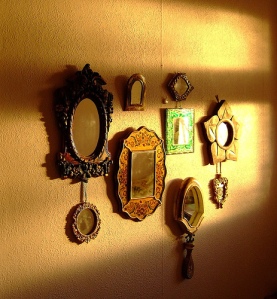Someone who only knows what he has learned and not how he learned it, still has a lot to learn
As a child I was entranced by my own reflection in the mirror and I could stare at it for hours and hours on end. My mother used to scold me in a semi-lighthearted manner; ‘stop looking at yourself in the mirror’, ‘you’re so vain’ and ‘it’s not a good thing in a girl your age’. But I paid scant attention. I was endlessly fascinated at what I saw staring back at me from the other side.
This continued into my teenage years, with friends likening me to the vain, self-righteous but oh so generous cat from the series ‘The Red Dwarf’ and they were often heard quoting a line from the show ‘don’t let her near a mirror – she’ll be there all day!’
However, my mirror gazing has stood me in good stead, for reflection has been the way in which I have learnt most of the things I know about what I know. Suffice to say, I feel rather qualified to be writing on the subject, but perhaps in a slightly different, less egocentric way than what I experienced in my childhood and young adult years.
Let me explain. Having left school at the age of 16 and only just barely scraping through my School Certificate exams, I started a career in hairdressing and completed a 3 year apprenticeship. This was as close as I ever got to the traditional ‘craft model of learning’ and the type of ‘received’ knowledge that goes with it. A few years later I decided to do what every New Zealander does before marriage and children – I moved to Australia. After a successful career change and foray into the world of high rollers, casino management and an exciting – if not life affirming – 7-year stint in South East Asia, I moved to Finland. Beautiful, serene and ‘in your face, focus on the NOW – it’s minus -22:c’ Finland.
Enter career change number 3. Teaching.
Now I had never experienced the ‘applied science model’ of knowledge development like many of my Finnish friends who had passed through formal teacher training programs (such as a 5-year Masters and pedagogical studies) to gain their qualifications (note: in no way do I mean to suggest that this way of learning is not relevant – my main argument is for a more integrated approach).
And for many years I felt very ashamed to admit that I hadn’t been through those hallowed halls of knowledge and thought my life experience really didn’t count for too much.
That was until several months ago when two things happened.
As I got closer to the end of the studies for my MSc Educational Management, I began to look back over what I had achieved. Thousands upon thousands of words (not to mention hours and incredibly generous students!) of action research centered solely on the learning context in which I live. And I began to think about the contribution this had made to my leadership skills e.g. my ability to be adaptive, present, moral and innovative (more on these 4 in coming posts).
I was also invited to give an online interview and a keynote speech on my personal and professional journey. And due to a combination of these two events I had – well – nothing short of an epiphany. I came to realize that if it wasn’t for all that experiential learning and reflection, then I most probably wouldn’t be where I am today. In fact, I’m sure I wouldn’t.
And where I am is something to be proud of. Just putting the finishing touches on my MSc dissertation (Learning Organisations) and busy planning my next steps into the world of more action research, PhD’s and doctorates.
But what’s all this got to do with developing your leadership skills you may well ask? Well, it was a few months later that I read this post on celebrating what the writer calls our ‘onlyness’. I believe this concept is closely tied to the power of reflection in & on our actions and experience. She talks about how our experiences are ‘a source of what we create’ and you can read my response to her very insightful post here.
When we know how to monitor and reflect on those actions, not only can that process help us develop as individuals, but I believe it can also open the ‘leadership learning gate’ – encouraging us to develop better and more mindful leadership practices – which in turn means better organisational learning.
CALL TO ACTION: Think back over the last 2 years and reflect on your personal and professional achievements. Write them down and ask yourself the following questions;
- How have these achievements contributed to the development of your leadership skills in your context?
- Have you become more adaptive, present, moral or innovative? Or something else perhaps?
- What are the implications of this development for you, your family, your team, your organisation and your community?
NOTE: the extensive personal history shared above is also by way of introduction in what is my first, but most certainly not my last, post!

